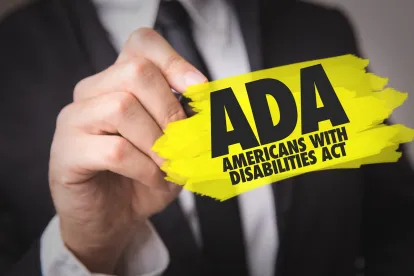The Ninth Circuit Court of Appeals issued its highly-anticipated website accessibility opinion in Robles v. Domino’s Pizza, reaffirming the obligation to make retailers’ websites accessible and rejecting the due process and primary jurisdiction arguments commonly asserted by defendants in website accessibility litigation. While this is undoubtedly a blow to the defense bar, it was not entirely surprising, and the court did provide some helpful commentary for the defense bar.
Guillermo Robles, a blind person, filed a lawsuit under the Americans with Disabilities Act (ADA) and the California Unruh Civil Rights Act, alleging that the Domino’s website and mobile app were not compatible with the screen-reading software that Robles and other blind persons use to access websites. The district court dismissed the case, finding that (1) applying the ADA to the website and app violated due process because of the absence of technical compliance standards (e.g., Web Content Accessibility Guidelines (WCAG) 2.0, Level AA), and (2) under the primary jurisdiction doctrine, the case would be better decided after the U.S. Department of Justice (DOJ), the agency responsible for issuing regulatory guidance, issued standards regarding website accessibility. Robles appealed.
In its opinion, the Ninth Circuit repeated its allegiance to the “nexus” theory, which says that only the goods and services of a physical, brick-and-mortar place of public accommodation need to comply with Title III of the ADA. The court also confirmed that the ADA applied to the Domino’s website and app even though the services provided through the website and app (e.g., ordering pizzas) are predominantly accessed away from the “bricks and mortar” restaurant. The court rejected Domino’s’ argument that imposing liability on it in the absence of specific technical compliance standards violated due process. In short, the court found that Domino’s received fair notice that its website and app must comply with the ADA and that, although imprecise, the ADA makes it clear that websites must effectively communicate with disabled customers and facilitate “full and equal enjoyment” of the public accommodations’ goods and services. Finally, the court found that the district court erred in invoking the primary jurisdiction doctrine because doing so, in light of the DOJ’s withdrawal of rulemaking related to website accessibility, would unduly delay the resolution of claims that the court can decide.
The case was remanded back to the district court to conduct discovery and decide whether the Domino’s website and app provided Robles with equal enjoyment of Domino’s’ goods and services. It remains to be seen whether Domino’s will appeal to the Supreme Court of the United States.
Key Takeaways
- Public accommodation websites must be accessible if the goods and services relate tothe place of public accommodation, even if the provision of goods and services do not occur on the premises of the public accommodation. At the same time, a website or mobile app must have a “nexus,” or connection, to a physical place of public accommodation to be covered by Title III of the ADA. Purely virtual businesses may not be covered by Title III, at least not in the Ninth Circuit.
- There is still the possibility that providing 24/7 toll-free customer service assistance could be an acceptable way to provide access to the goods and services in lieu of an accessible website or app, but factual questions remain as to whether such telephonic or other access is equivalent to what is available on the website.
- Consistent with the DOJ’s position in its September 25, 2018 letter regarding website accessibility, the court noted that public accommodations are provided “maximum flexibility in meeting the [ADA’s] requirements.” Nonetheless, conformance to WCAG 2.0 or 2.1 likely remains the only predictably safe standard to ensure that websites comply with the ADA.




 />i
/>i
